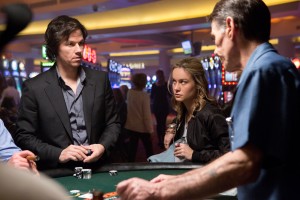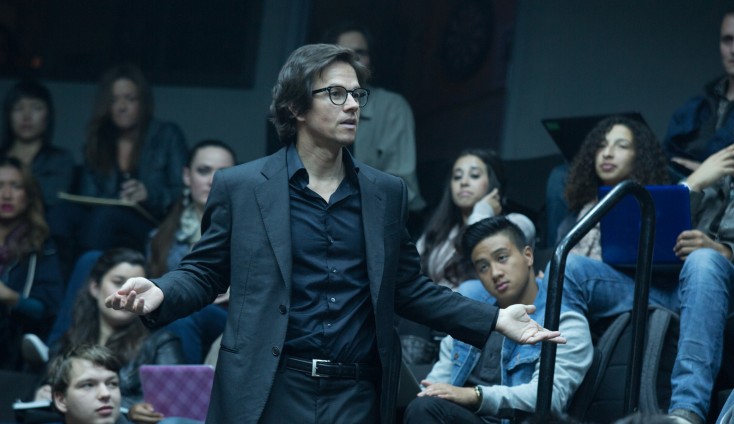
Left to right: Mark Wahlberg is Jim Bennett and Brie Larson is Amy Phillips in THE GAMBLER. ©Paramount Pictures. CR: Claire Folger.
By ANGELA DAWSON
Front Row Features
HOLLYWOOD—While most people suffer from procrastination, especially when facing a difficult or seemingly insurmountable task, actor Mark Wahlberg has adopted quite the opposite approach.
Take, for example, his boxing scenes for 2010’s “The Fighter.” Those were shot during the first three days of shooting, he recalled during a recent phone interview from New York. That way, the rapper turned A-list actor, figured he didn’t have to keep up his vigorous workout regimen so he could concentrate on the less physical demands of his role for the rest of the production.
Similarly, the two-time Academy Award nominee (“The Fighter,” “The Departed”) worked it out with Rupert Wyatt, the director on his new film “The Gambler,” to shoot his dialogue-heavy scenes in a college lecture hall during the first few days of principal photography so he could focus his attention for the rest of the shoot on the remainder of the script.
“The Gambler” is a reimagining of the 1974 drama that starred James Caan as a literature professor with a serious gambling addiction. He borrows from family, friends, and then some loan sharks. His only way out of debt is to convince one of his students, a rising basketball star, to shave points during an upcoming game.[private
The update is written by William Monahan based on James Toback’s original script.
During our brief interview, Wahlberg spoke about taking on the remake, tackling another Monahan-penned script, what scared him most about this role, betting with other people’s money for research and making amends for a past transgression.
Q: I heard that you went to Hong Kong to prepare for this role by gambling, and you lost $45,000 on the roulette table. Is that true?
Wahlberg: It was in Macau; we were shooting “Transformers” in Hong Kong. We flew to Macau to gamble. It’s considered the Mecca of gambling now.
Q: This was purely for research purposes, right?
Wahlberg: Yes.
Q: Was the outcome different from what happens to your character in “The Gambler?”
Wahlberg: No. The outcome was spot on to what happened in the movie because I got this crazy hand in blackjack where I got an ace and then another ace and then I split them and got a third ace, and then I got a Jack, a Queen and King. So I won a lot of money. But then I took it to the roulette table, put it all on black, and lost it all. It was okay because the money I used to play blackjack and then lost on roulette was money that I borrowed from some businessmen that I knew from Hong Kong.
Q: And they were cool with that?
Wahlberg: They expressed some concern as I was putting the money down, but they didn’t prevent me from doing it. It was up to them.
Q: It’s always disappointing to lose but I hope you had a good time otherwise.
Wahlberg: I had a blast. I left there with a big smile on my face.
Q: Had you seen the original “The Gambler” before?
Wahlberg: Oh yeah, I’d actually seen it sometime during the ‘80s with my dad. I watched a lot of great movies with my dad while growing up. It was one of the things we most liked to do when we were spending time together—watching movies. And then, of course, I’d probably seen it once or twice before it came my way, as far as the Monahan remake.
Q: You were familiar with Bill’s work since he wrote “The Departed” for you.
Wahlberg: And he wrote “American Desperado” for us, which we will be making soon. And I also acted in the film that he just directed called “Mojave.” I have the luxury of being in four Bill Monahan pieces. He’s become my favorite writer in cinema.
Q: This version has a different ending from the original. Did you guys talk about it? How did it come about?
Wahlberg: It was already kind of there and Rupert and I liked it very much. (My character) was running away from his past and hopefully to a new beginning but still, as he arrived, he was still very much in doubt of what would happen next. He’s probably more scared of starting over than being in debt to some of the most dangerous guys in the Los Angeles underworld.
Q: Rupert Wyatt, of course, is quite a respected director, having directed “Rise of the Planet of the Apes” and “The Escapist,” and you did “Planet of the Apes” with Tim Burton. Did that connection ever come up in conversation?
Wahlberg: Sure, we talked about that. We talked about a lot of things. We spent quite a bit of time together, getting to know each other and really enjoying each other’s company. We did a lot of research together. I took him to various underground poker games. We went to college basketball games. We really did a lot together. We had writing sessions, rehearsals, casting—the whole process. We had a laugh about our experience with Fox at making “Planet of the Apes.” I talked about my joy of working with Tim Burton so yeah we talked about everything.
Q: Your co-stars include big screen legends like George Kennedy and Jessica Lange, who plays your mother, and of course, John Goodman, who plays a loan shark, with a soft spot for your character. How was it working with such a great cast?
Wahlberg: Bill’s writing is as deserving of the credit for attracting the cast as anybody. Even though my character Jim (Bennett) is the centerpiece of the movie, and I’m in every scene, once these other characters come in, they really have their moments to shine. So working with Jessica, George and John Goodman—who’s one of the great character actors of all time—Richard Schiff and Brie Larson—who I think has a very very bright future ahead of her—just the entire cast, was fantastic.
Q: What scene was particularly challenging for you?
Wahlberg: The elephant in the room was always the lectures in the classroom. The original lecture was probably 13 or 14 pages long. It was just a lot of dialogue for my character. For six months before we started shooting, we would get together with literary professors in places and read the script out loud. We’d assign different characters to different people and just read stuff and try stuff. That is what I wanted to shoot first. Rupert thought I was crazy because it was a pivotal scene. We had four days in the classroom but the first two days was the first big lecture, when the audience realizes Jim’s a professor, and he confronts Brie’s character, Amy.
Q: Did you ever imagine in your wildest dreams that you’d be playing a college professor?
Wahlberg: No I didn’t. And when they asked I jumped at the opportunity to play that part.
Q: Did you research why some people become addicted to gambling and some people don’t?
Wahlberg: I didn’t do any research on the subject but I know enough gamblers to know it’s certainly not for me. It’s fairly obvious for me that it would be a very bad choice to become a gambler. There are very few people that are successful at it. Vegas, Atlantic City and all these other gambling towns are designed to make money for themselves and not give people money.
Q: Isn’t producing a bit of a gamble because you never know if your film is going to be successful at the box office or not?
Wahlberg: Absolutely, but I have no problem taking a gamble if I’m betting on myself. I have more of a problem betting on some sports team or some other guy dealing the cards. That’s why even when I was gambling in preparation for the movie I was playing games I knew I could win. I usually like to play it safe and take the sure thing, and if I’m going to gamble, like you said in producing, I’m going to bet on myself. Yet “The Gambler” is a big gamble because studios don’t make these kinds of movies that much but, hopefully if it is successful, and as I continue to make these bigger commercial movies for them, then they’ll allow me to make these smaller movies that I’m really passionate about.
The great wave of giant effects films is getting a little stale. People are noticing that just because you have these giant effects, they’ve seen this stuff before. So it’s not necessarily drawing people into the theater in droves. I think there is a desire and a hunger for these character-driven pieces. There are always five or six of them that work every year, at the end of the year. But, hopefully, we can sprinkle a little more of these throughout the rest of the year, and fulfill more of the desire of people who like to see these kinds of movies.
Q: There’s been a lot of speculation about why are you seeking a pardon from the Massachusetts parole board for the assault you were convicted of committing several years ago. Can you talk about that?
Wahlberg: For 27 years, I’ve been trying to correct the mistakes I made as a juvenile, and hopefully, I’ll continue to do enough work away from my job with community service, working with inner-city and at-risk youth, and philanthropic work that will allow me to kind of prove myself worthy of getting a second chance.[/private]





